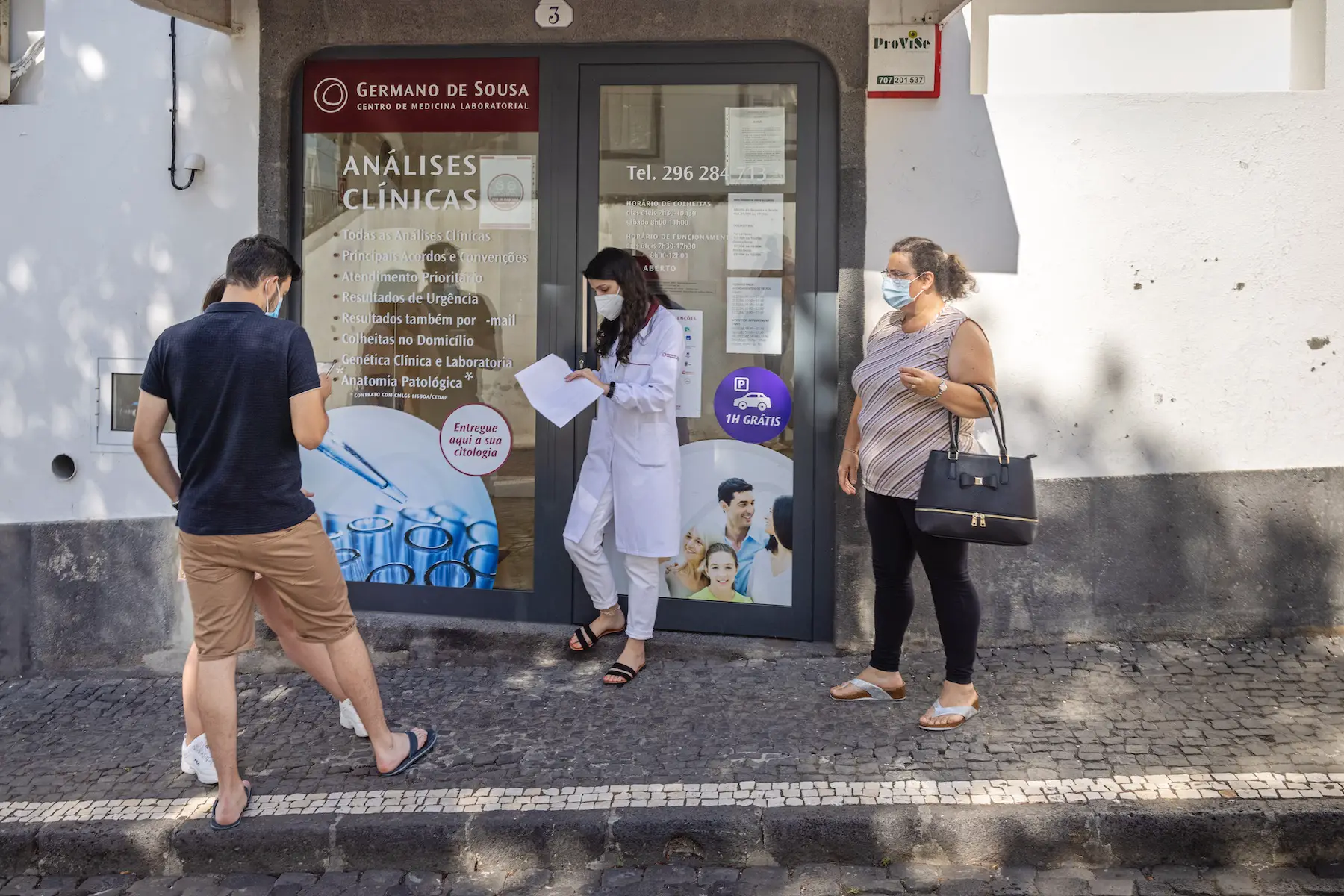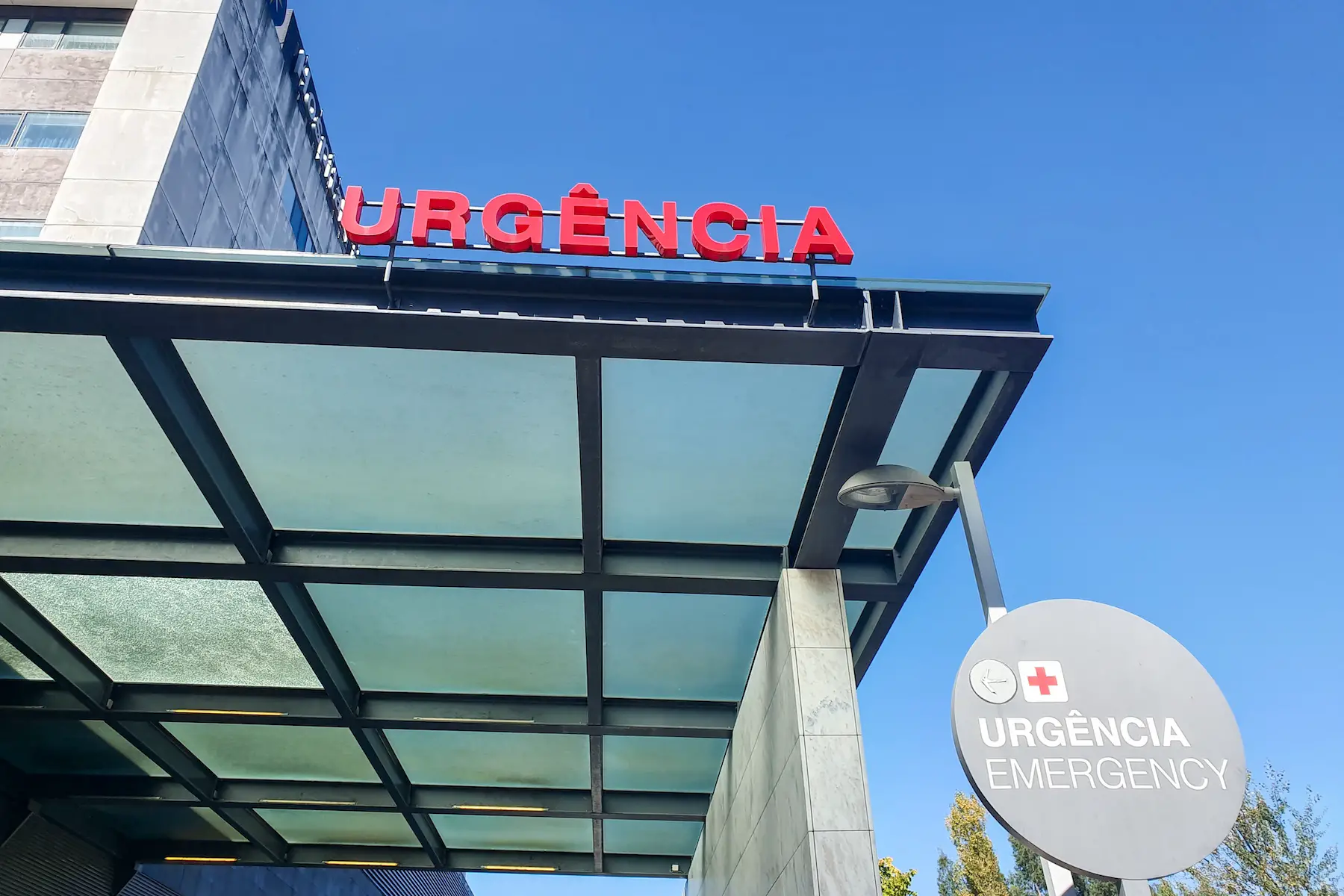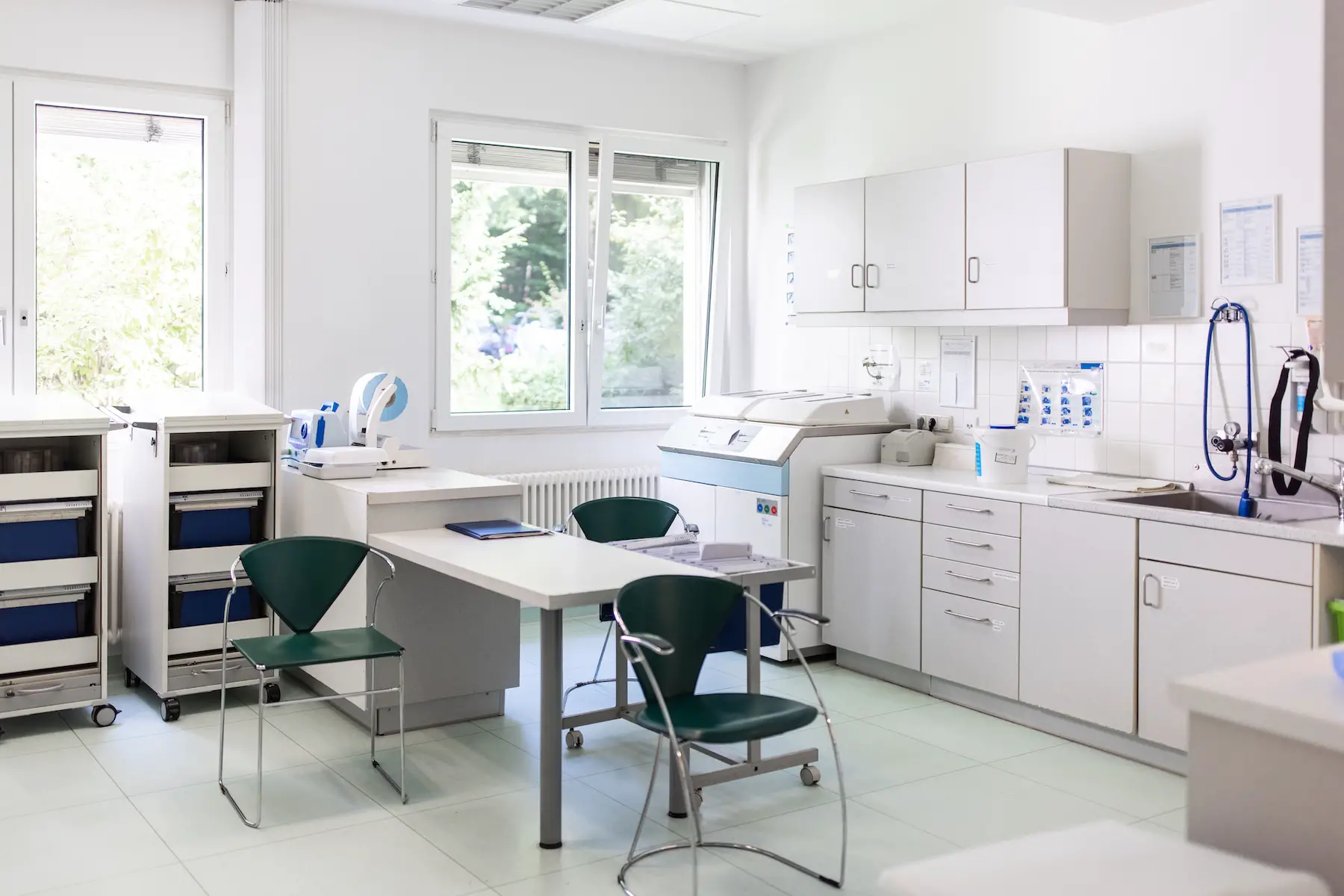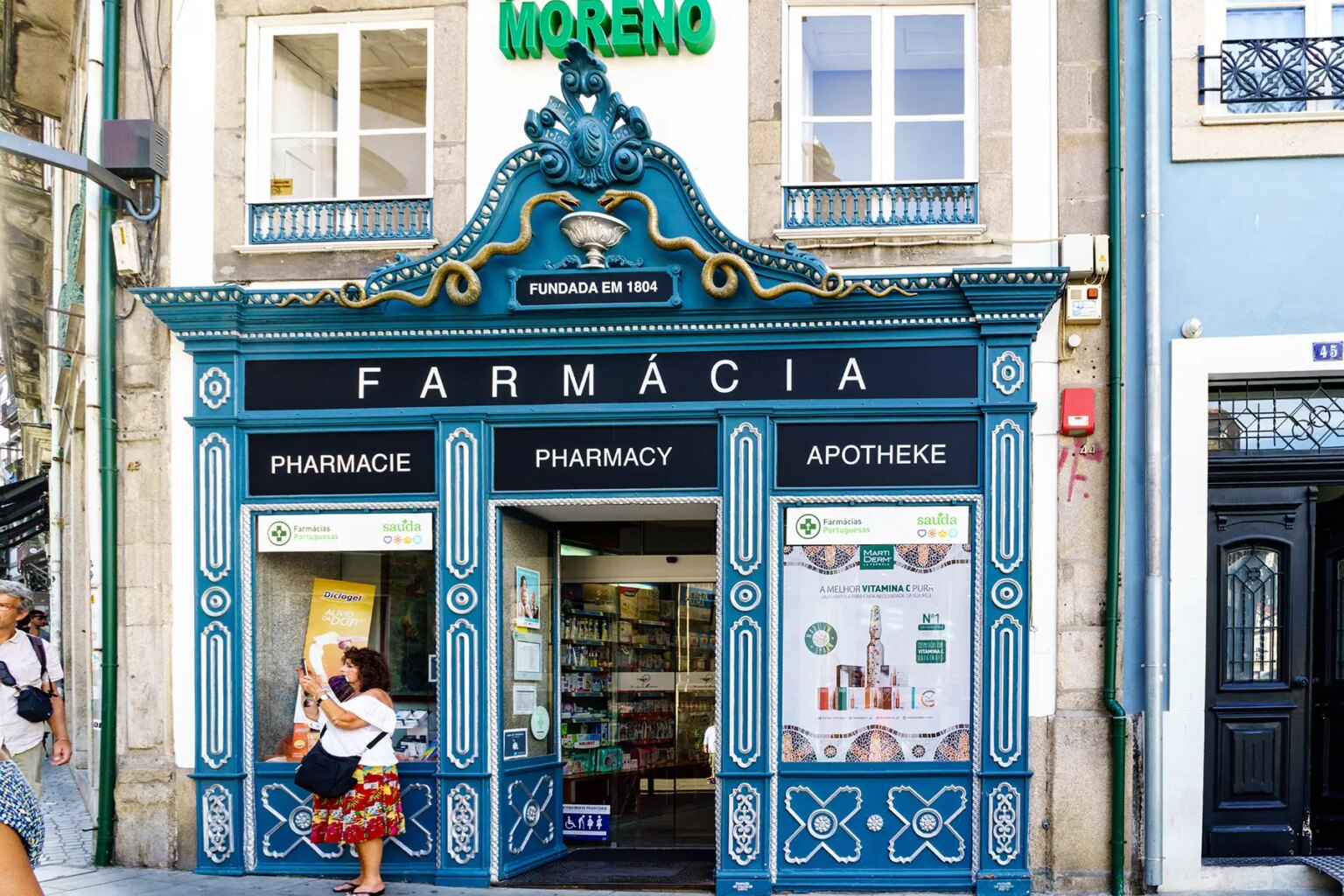If you are an international working in Portugal, you should be eligible to access subsidized state healthcare. The Portuguese healthcare system incorporates both public and private medical care, and the quality of treatment is very high for students, retirees, and families alike. Although Portugal made almost all medical care free in 2022, you may still encounter long wait times when seeking treatment.
Keep reading to learn how internationals can access healthcare in Portugal and in which instances you may have to pay for care. This article includes the following:
- Overview of healthcare in Portugal
- How much is healthcare in Portugal?
- Portuguese health insurance
- How to register for healthcare in Portugal
- Private healthcare in Portugal
- Portuguese doctors and specialists
- Women’s healthcare in Portugal
- Children’s healthcare in Portugal
- Portuguese healthcare for seniors
- Portuguese dentists
- Hospitals in Portugal
- Portuguese healthcare centers
- Portuguese pharmacies
- Mental healthcare in Portugal
- COVID-19 in Portugal
- Long COVID support in Portugal
- Portuguese physical therapy
- Alternative medicine in Portugal
- Portuguese community-based health and wellbeing
- Portuguese healthcare in an emergency
- How to make a complaint about Portuguese healthcare
- Portuguese medical words and phrases
- Useful resources
C1 Broker
C1 Broker compares and finds the right health insurance for you. Based in Portugal, C1 Broker offers private national and international health insurance from providers such as Médis, Allianz Portugal, Fidelidade, Victoria, April, and DKV. Connect with C1 Broker’s expert healthcare team for a personalized policy. Get your free online appointment now.
Overview of healthcare in Portugal
The Portuguese healthcare system
The healthcare system in Portugal consists of three separate systems:
- The Servico Nacional de Saúde (SNS – National Health Service)
- Occupation-based social health insurance schemes (health subsystems) that are used in the public sector and in certain professions such as police, military, and banking
- Voluntary private health insurance

The Ministério de Saúde (Ministry of Health) is in charge of managing Portugal’s SNS. Similarly, it is free and available to all residents, including expats in Portugal. However, charges have been introduced for many services in recent years. The public system covers both primary and secondary medical care in Portugal, including:
- Doctor visits
- Maternity care and birth
- Some dental treatments
- Community healthcare
- Hospitals and specialist care
- Emergency services
The SNS covers mainland Portugal while the Azores and Madeira have their own healthcare systems. Five regional health administrations throughout Portugal (North, Central, Lisbon and Tagus Valley, Alentejo, and Algarve) deliver healthcare services.
How good is healthcare in Portugal?
Portugal has a high standard of healthcare services, with a large population of doctors and a strong emphasis on preventative treatment, such as cancer screenings.
Compared to other countries, Portugal’s healthcare ranking is not very high. It dropped from 17th in 2021 to 22nd in 2022 out of 32 countries on FREOPP’s World Index of Healthcare Innovation. Portugal scored very high in healthcare quality but extremely low in affordability and technological advancements.
However, it’s worth noting that since FREOPP’s ranking was released, Portugal abolished user fees associated with all non-emergency medical care.
Who can access healthcare in Portugal?
Eligibility for the Portuguese healthcare system is based on being a legal resident. This can include non-working residents under certain conditions, such as unemployed, retired, or dependent family members.
Non-residents and temporary visitors to Portugal must purchase private health insurance to cover their stay. However, those on short visits from the European Union (EU), European Economic Area (EEA), and Switzerland can access public healthcare in Portugal through their European Health Insurance Card (EHIC).
Nationals from non-EU countries that have reciprocal healthcare agreements with Portugal may also be able to access the public system for free or at a reduced cost. However, other non-EU residents must purchase private health insurance to get coverage.
How much is healthcare in Portugal?
Healthcare in Portugal is funded through general taxation and social security contributions from working residents’ salaries. However, those who are not employed, dependent family members, and retirees don’t make contributions.
As of 2021, Portugal spent 10.5% of its GDP on healthcare, making it the 11th biggest spender of EU/EFTA countries. This comes out to just over €2,000 per inhabitant annually.
Since June 2022, Portuguese residents are no longer required to pay for medical treatment at a hospital, inpatient or outpatient. There are only two specific instances in which medical care is not free:
- If you seek emergency services without prior recommendation (through a health center or over the phone) from the SNS
- If you seek emergency services and do not require hospitalization afterward
Portuguese health insurance
Health insurance in Portugal is covered by your employment-based contributions to the Instituto da Solidariedade e da Segurança Social (Social Security Institute), through your EHIC for EU visitors, or through private health insurance.
Some residents (around 25% of the population as of 2017) also opt for private health insurance to supplement their public coverage. This could cover extra services that the Portuguese healthcare system does not include or reduce out-of-pocket medical costs. This also entitles them to treatment from private healthcare providers in Portugal, which can be quicker than public healthcare services.

Unemployed and retired residents don’t need to make social security contributions. If you’re an EU resident retiring in Portugal, you are still entitled to public healthcare if you complete an S1 form. This form shows that you contributed to social security and are entitled to healthcare in another EU country.
Large expat-friendly health insurance companies that provide private coverage packages are numerous, such as:
How to register for healthcare in Portugal
To register for public healthcare in Portugal, you first need to sign up with social security (seguranca social) to get your número de indentificação fiscal (NIF – tax identification number). Your employer usually does this if you already have a job. Self-employed people, however, need to arrange this on their own.
Once your social security arrangements are in place, you can register for an SNS user number (número de utente do SNS) at your local Portuguese health center (centros de saúde). You will need to take along a few items, such as:
- Your social security card
- Your passport or national ID card
- Portuguese residence permit
If you are staying in Portugal long-term but do not yet have a residence permit, you can still register provisionally by calling 808 24 24 24 and asking for a temporary user number. For Portuguese citizens, your SNS user number is displayed on your cartão de cidadão (citizen card).
Once you have a user number, you can sign up with the SNS online portal to access healthcare information, find providers, and make appointments online.
Private healthcare in Portugal
Private healthcare in Portugal exists alongside the public SNS provision, although some doctors work in both sectors. The costs for private doctor services, specialists, and hospitals can be covered by taking out private medical insurance, like Allianz Care.
Like elsewhere, private healthcare in Portugal is more expensive, though less than in other European countries. An appointment with a private doctor will cost around €40–50. Waiting lists for private services are typically shorter; there is wider availability of services and more chance of being seen by English-speaking staff.
Private health insurance like Cigna Global is common with internationals in Portugal because services like dental and eye care have limited coverage through the SNS. As a result, some residents have little option but to seek out private providers.
Unlike the SNS, which is essentially free at the point of use, you will typically have to pay for private services upfront and claim a reimbursement from your insurer. Check your policy for exact details and procedures.
Portuguese doctors and specialists
Doctors in Portugal are part of the primary medical services covered by the Portuguese healthcare system. Most doctors are based at public health centers, and once you have registered for public healthcare in Portugal, you can make an appointment with a doctor.
Public health insurance covers the full cost of visiting a doctor in Portugal. To ensure costs are covered, you will need to check that your doctor is contracted to offer services through Portugal’s public healthcare system. Some doctors in Portugal only provide private services.

To see a specialist (e.g., cardiologists, psychologists) through the state healthcare system, you will typically need to be referred by a doctor. Patients usually have to pay something towards seeing a specialist in Portugal.
Depending on what kind of treatment you need and what type of specialist you see, you may need to wait. However, the SNS sets guaranteed maximum wait times that vary by treatment location and patient condition severity. You can use the official MySNS Times mobile app to see the average wait times in national healthcare hospitals across Portugal.
Women’s healthcare in Portugal
Health centers, hospitals, and clinics deliver women’s healthcare in Portugal. The national health system covers maternity care, and pregnant people receive fully paid treatment through the SNS. Private care is possible if the patient has the appropriate insurance coverage.
Prenatal care takes place at the hospital. During the first appointment, the mother-to-be will receive a Pregnancy Booklet (Boletim de Saúde da Grávida) in which the doctor will record ongoing medical information as the pregnancy progresses. Maternity wards in Portuguese hospitals also offer prenatal classes; however, they are not usually subsidized through public health insurance in Portugal. In addition, midwives and doulas are available to help with the birth.
Gynecologists work in health centers and clinics. You can access them through your primary care doctor. They can provide health advice and carry out routine examinations.
In terms of reproductive health, contraception is widely available and used in Portugal. Furthermore, you don’t need a prescription for the birth control pill, and you can buy condoms from many places, including drugstores and supermarkets.
Since 2007, abortion has been legal in Portugal in the first 10 weeks of pregnancy. However, you must consult your doctor first and wait three days before the procedure. Abortion costs are usually covered by insurance. Contact the Associação para o Planeamento da Família (Family Planning Association) or visit their website for more information.
Children’s healthcare in Portugal
The Society of Portuguese Pediatricians (Sociedade Portuguesa de Pediatria) oversees children’s medical treatment. Portugal has a child and youth healthcare program, which began in 1992. Primary care doctors and pediatricians deliver children’s healthcare.

Children have access to free medical care in Portugal. The social security payments of their parent or guardian cover this. Children have regular health checks from birth and can access services, including screening and examinations, vaccinations, and nutritional healthcare. Furthermore, they will have a record that charts their progress.
- Hepatitis B
- Diphtheria, Tetanus, and Pertussis
- Polio
- Measles, Mumps, and Rubella
Portuguese healthcare for seniors
As Portugal is a popular place to retire, it’s hardly surprising that 23.7% of its population are over 65, the second-largest percentage of any EU country after Italy (23.8%).
Portugal offers several benefits for its older residents. For example, those who receive the Social Supplement for Seniors (Complemento Solidário para Idosos – CSI) are entitled to discounts on medicine at the point of sale. They can also receive a voucher for free dental care.
Although Portugal’s universal healthcare covers you for most eventualities, if you want to access a wider range of treatments and avoid waiting lists, it’s worth considering international health insurance. Providers include:
- Allianz Care
- Cigna Global – has a specific Individual Plan for Seniors
The country also provides several types of social support and care for older people, including:
- Home support (serviço de apoio domiciliário): these services provide assistance with hygiene, meals, entertainment, and other daily activities.
- Community centers (centro de convívio): these social venues are designed to prevent loneliness and encourage participation in local life.
- Day centers (centro de dia): these cater to over-65s during the day.
- Night centers (centro de noite): these offer assistance to those who experience loneliness, insecurity, and isolation at night.
- Family care (acolhimento familiar): this option allows for temporary or permanent stays with families who can provide a secure environment.
- Residential structures (centro de férias e lazer): these offer accommodation for over-65s who require nursing care.
Find the nearest local assistance on Portugal’s Carta Social.
Portuguese dentists
Free dental care isn’t available on the SNS unless you belong to a vulnerable group, such as children, pregnant patients, older adults, or disabled residents. To see if you qualify, visit the SNS webpage for dentist checks (cheques dentista). If you do qualify for free dental care, you must first meet with your general doctor and request a voucher for a dentist appointment.
Otherwise, you can visit any dentist in Portugal and expect to pay the going rate for dental procedures. Fortunately, dentistry is not expensive in Portugal. However, if you have a high need for dental work, such as crowns and bridges, it may be worth looking into private insurance to help cover costs.
Hospitals in Portugal
People who register at a local health center can access Portuguese hospital services at a discount, sometimes even free. Make sure to bring your SNS user number with you.
Unless you’re going to the hospital for a true emergency, you will need a referral from a Portuguese doctor or the SNS directly first. Public hospitals in Portugal provide services including:
- Emergency treatment
- Outpatient treatment
- Nursing
- Post-operative care
- Maternity care
- Psychiatric care
- Care for those with a terminal illness
Keep in mind that if you did not obtain a referral and you are not admitted to the hospital as a result of your visit, you will be responsible for paying the treatment costs.
Portuguese healthcare centers
There are numerous health centers all over Portugal where you typically start any process for seeking treatment. Health centers are where most doctors in Portugal are based; in fact, this is where you have to first register for public healthcare in Portugal.

Most Portuguese health centers are open from 8:00 to 20:00, and various health professionals run these. As well as general doctors, you can find maternity and childcare services, basic non-life-threatening emergency care, and sometimes dental services. Visit the SNS website for information on where to find your local health center in Portugal.
Portuguese pharmacies
In town centers and shopping malls, you can find pharmacies (farmácias) in Portugal. General hours of operation for Portuguese pharmacies are 9:00–19:00 on weekdays (with a lunch break between 13:00 and 15:00) and 09:00–13:00 on Saturdays.
Duty pharmacies (farmácias de serviço) stay open out-of-hours for emergencies. You can find a list of pharmacies providing 24/7 services on the SNS website.
Public health insurance in Portugal generally covers some of the costs of prescription drugs. However, you usually need to contribute a payment. How much you pay depends on whether you’re a vulnerable group and if the medication is necessary for your health. The SNS covers up to 90% of necessary medications.
Mental healthcare in Portugal
Portuguese mental healthcare professionals provide their services in health centers and hospitals nationwide. However, despite Portugal having higher than EU average levels of depression and substance abuse, its mental healthcare provision is not as strong as other countries. There were only 12.4 psychiatrists per 100,000 inhabitants as of 2020.
You can access mental health services through the SNS. However, your general doctor should be your first point of contact. Depending on your situation and service availability in your region, your primary care doctor can:
- Prescribe medication
- Refer you for counseling
- Refer you to a specialist
- For more serious conditions, refer you to a psychiatric or emergency unit
- Refer you to a community-based program
Only some mental health services are available. Therefore, you will need to purchase private health insurance to access a broader range of treatments. You can find psychiatrists and psychologists in Portugal’s public and private sectors.
COVID-19 in Portugal
As of 2023, the Portuguese government has lifted most of the restrictions they placed in 2020 to curb the spread of COVID-19. Negative COVID tests and proof of vaccination are no longer required to visit Portugal except for travelers from China. You can get a COVID test at most Portuguese airports.
Although COVID measures are no longer strictly implemented, there are recommendations for visitors and residents alike to stay safe while going out in Portugal. For instance, the Portuguese Clean & Safe seal of approval for companies signifies those that take proper hygiene measures against the spread of COVID-19. It is still required to wear a mask in healthcare settings nationwide and recommended in very crowded spaces or during travel.
Fewer dedicated COVID testing sites are available as of 2023, but you can easily get a home test at any pharmacy or grocery store. Should you test positive for COVID-19, the Portuguese government recommends immediately self-isolating for 10 days.
Long COVID support in Portugal
Portuguese researchers currently estimate that the condition known as long COVID (COVID de longa duração) affects 10–20% of all recovered patients.
If you live in Portugal and have been experiencing COVID symptoms after recovery, the first thing to do is see your primary care doctor. Many Portuguese doctors and clinics are informed about the realities of long cases and offer post-COVID consultations (consulta pós-COVID) for patients still suffering from symptoms.
Inspiro2 is a Portuguese association that offers free online respiratory physiotherapy sessions to long COVID patients. You can reach out to them via their website if interested.
Children can also develop long COVID. Going to the child’s pediatrician about their symptoms and medical history is a good first step. The SOS Criança hotline supports parents of children suffering from long-term illnesses and mental health conditions.
Portuguese physical therapy
Physical therapy (fisioterapia), often known as physiotherapy, is a recognized and growing practice throughout Portugal. The Associação Portuguesa de Fisioterapeutas (AFPisio – Association of Physical Therapists) lists 21 schools in Portugal where students can learn to practice physiotherapy.

AFPisio says over 12,000 physical therapists are currently working in Portugal, and its website offers a map to search for providers. Portuguese hospital network CUF lists physical medicine and rehabilitation as one of their primary medical specialties.
As with most specialist services, you must obtain a referral from your general doctor for physical therapy in Portugal. Those with acute conditions requiring immediate rehabilitation (in Portuguese) can get faster treatment on the public scheme. However, if you are looking for physical therapy with short wait times, it may be worth going through private care instead.
Alternative medicine in Portugal
Although alternative and complementary medicine is generally unavailable through the SNS, it is common in Portugal. Licensed professionals practice alternative and complementary treatments in specialty clinics nationwide.
You will have to pay out of pocket for these unless you have a private insurance policy that covers them. Practitioners have integrated acupuncture to some degree into regular medical practices; you can access this through your general doctor.
Licensed treatments in Portugal include:
- Chiropractic
- Osteopathy
- Naturopathy
- Herbal medicine
- Massage
Portuguese community-based health and wellbeing
Some common examples of Portuguese health and well-being initiatives include community gardens (hortas comunitárias) and cultural and art projects. These initiatives have shared benefits for individuals’ physical health and the greater community. Since these are relatively small community projects in Portugal, the best way to learn what gardens and cultural projects are active near you is to ask around or search online for your specific city or neighborhood.
Portuguese healthcare in an emergency
Emergency treatment in Portugal is available to everyone regardless of residence status or insurance. Once your condition has stabilized, however, you need proof of your Portuguese residence status or health insurance to cover the costs.

The main emergency number in Portugal is 112, which connects you to ambulance, police, and fire services. If you describe your emergency to the operator, they will know which service to send to your location.
How to make a complaint about Portuguese healthcare
Those insured under the SNS have certain rights and duties granted by the Ministry of Health, including the right to lodge complaints and seek compensation for damages. The Entidade Reguladora da Saúde (ERS – Health Regulatory Entity) regulates Portuguese healthcare providers across the public and private sectors.
If you have a conflict with a clinic, hospital, or healthcare provider in Portugal, the ERS has set a specific process (in Portuguese) for reaching a resolution. The first step is to contact the provider directly and say that you wish to submit a formal, written complaint with them in person or online. Once you’ve done this and received a copy of your complaint, they must legally forward it to the ERS.
At this point, the ERS requests that you also submit a copy of your complaint to them using their online form, by email, or by mailing a letter to their office. The provider then has 10 days to respond to you directly.
If you prefer, the ERS offers mediation services between users and providers as an alternative to the traditional complaint process. You can request conflict resolution through mediation on the ERS website.
Portuguese medical words and phrases
If you’re still in the process of learning Portuguese, it can help to know a few medical terms. Here are some of the most common:
- Call an ambulance: Chame uma ambulância
- I would like to see a doctor: Gostaria de ver um médico
- I am sick: Estou doente
- I’d like to make an appointment: Gostaria de marcar uma consulta
- Health center: Centro de Saúde
- Hospital: Hospital
- Doctor: Médico
- Medicine: Medicina
- Pharmacy: Farmácia
- Maternity: Maternidade
- Emergency: Emergência
Useful resources
- Servico Nacional de Saúde – official national health service website
- Seguarança Social – Portuguese national social security agency
- Associação para o Planeamento da Família – Portuguese family planning association
- MySNS Times – official SNS mobile app that shows wait times at Portuguese hospitals








